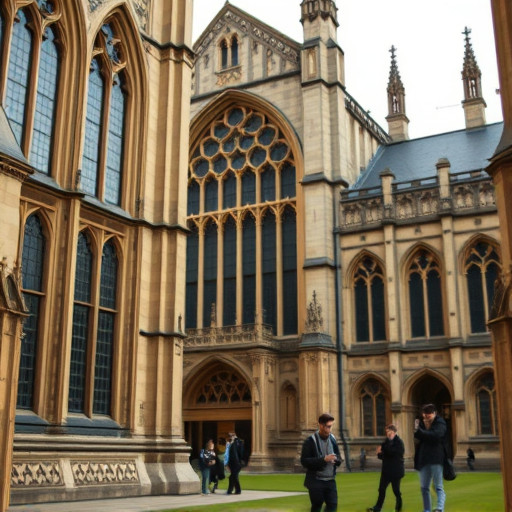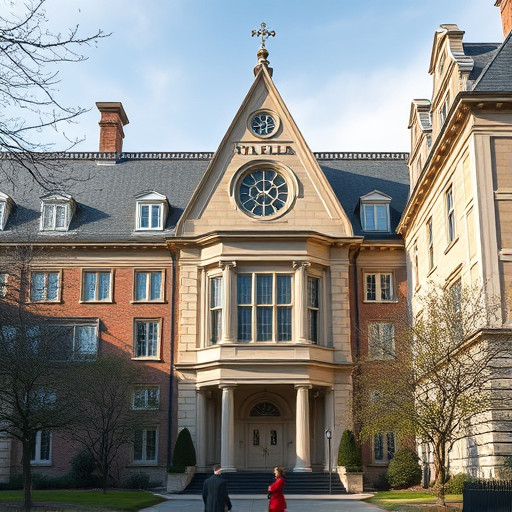University of Cambridge – Fusing Rich Heritage with Premier Education

The University of Cambridge: Combining history and top-tier academic programs at Cambridge University attracts countless ambitious students from around the globe. This prestigious institution, steeped in centuries of academic tradition, not only stands as a beacon of intellectual prowess but also offers an unparalleled educational experience that shapes the leaders of tomorrow.
Exploring the Historical Significance of Cambridge
Cambridge is synonymous with excellence in education, but its foundations can be traced back to a rich tapestry of history that intertwines with its academic pursuits.
The Origins of Cambridge University
With roots stretching back to 1209, the University of Cambridge has been pivotal in shaping the landscape of higher education. Scholars fleeing from Oxford due to political unrest established this renowned university, marking the beginning of an academic journey that has spanned over eight centuries.
The very architecture of the university reflects its storied past, featuring stunning Gothic structures and serene college courtyards that have witnessed groundbreaking discoveries and intellectual debates. Each college within the university holds a unique narrative, contributing to the overall ethos of collaboration and scholarly excellence.
Notable Historical Figures
Throughout its illustrious history, the University of Cambridge has been home to many luminaries who have made profound contributions to various fields. Nobel laureates, philosophers, scientists, and writers have walked its hallowed halls, including Sir Isaac Newton, Charles Darwin, and Stephen Hawking.
These figures did not merely inhabit the university; they shaped its direction and left indelible marks on their respective disciplines. The legacy of their intellectual rigor continues to serve as inspiration for current and future generations of students.
The Evolution of Academic Programs
As the world evolved, so did the academic offerings at the University of Cambridge. Initially focused on liberal arts and theology, the university expanded its curriculum over the centuries to include a diverse range of disciplines such as natural sciences, engineering, social sciences, and humanities.
This evolution highlights the university’s adaptability to societal changes while maintaining its commitment to rigorous scholarship and research. Today, students benefit from cutting-edge programs and interdisciplinary studies, reflecting the dynamic nature of contemporary academia.
Understanding the Academic Framework of Cambridge
Delving deeper into the academic structure reveals the unique aspects that distinguish the University of Cambridge from other institutions.
Colleges and Their Role in Academia
Divided into 31 colleges, the University of Cambridge offers a distinctive collegiate system that fosters close-knit communities among students and faculty. Each college operates autonomously, providing personalized support and mentorship to students.
This unique structure encourages collaboration across disciplines, leading to innovative ideas and projects. Students often form lifelong friendships and professional connections through their college networks, enhancing their overall educational experience.
Research Excellence
Research plays a crucial role at the University of Cambridge, which consistently ranks among the world’s top research universities. With world-class facilities and resources, scholars engage in pioneering research that addresses pressing global challenges.
Students have the opportunity to participate in research initiatives, gaining hands-on experience and contributing to groundbreaking discoveries. This integration of research and teaching enriches the learning process, preparing students to think critically and creatively.
International Collaboration and Diversity
The University of Cambridge prides itself on its diverse international community, welcoming students from all walks of life. This multicultural environment promotes cross-cultural understanding and collaboration, enriching the academic experience.
Through partnerships with institutions worldwide, the university engages in collaborative research, student exchanges, and joint programs, reflecting its commitment to a globalized education. Such interactions prepare students to navigate an increasingly interconnected world.
Evaluating the Pros and Cons of Cambridge Education
Choosing the University of Cambridge is undoubtedly an exciting prospect, but it’s essential to weigh the advantages and disadvantages before making such a significant decision.
Advantages of Studying at Cambridge
One of the primary benefits of attending the University of Cambridge is its unparalleled reputation for academic excellence. Graduates from this esteemed institution are highly sought after by employers and often enjoy lucrative career opportunities.
Additionally, the extensive alumni network provides invaluable resources, mentorship, and job prospects for new graduates. The vibrant academic community fosters critical thinking, innovation, and creativity through engaging discussions and collaborative projects.
Another undeniable advantage is the wealth of resources available to students. From state-of-the-art libraries to research facilities and expert faculty, students have access to everything they need to excel academically.
Challenges Faced by Students
While the benefits are numerous, prospective students should also consider the challenges associated with studying at the University of Cambridge. The intensity of the academic workload can be overwhelming, demanding exceptional time management and study skills.
Moreover, the pressure to perform at a high level can lead to stress and anxiety for some students. It is crucial for individuals considering Cambridge to be aware of the mental health resources available and develop coping strategies to navigate these challenges effectively.
The financial implications of attending such a prestigious university cannot be underestimated. Tuition fees and living expenses can be considerable, especially for international students. However, numerous scholarships and financial aid options are available to help alleviate these costs.
Alternatives to the University of Cambridge
While the University of Cambridge is undoubtedly an outstanding choice, various alternatives may suit specific academic interests or personal circumstances.
Other Prestigious Universities
Several institutions rival the prestige and academic quality of the University of Cambridge. Some noteworthy alternatives include the University of Oxford, Harvard University, and the California Institute of Technology.
These universities offer similar academic rigor and networking opportunities, making them attractive options for prospective students. Each institution has its unique strengths; for instance, Oxford’s historical significance closely parallels that of Cambridge, while Harvard boasts a diverse array of programs and research initiatives.
Specialized Institutions
For students with specific interests, specialized institutions may provide tailored programs that better align with their goals. For example, the London School of Economics excels in social sciences, while Imperial College London focuses on science and engineering disciplines.
Exploring these alternatives can lead to discovering programs that resonate more profoundly with individual aspirations, thereby enhancing the overall educational experience.
Online Learning Opportunities
The rise of digital education has opened up a plethora of options for students seeking flexibility in their studies. Many reputable universities now offer online degree programs, enabling learners to pursue their education from anywhere in the world.
Institutions like Coursera and edX partner with leading universities to deliver high-quality courses and certifications. This evolving landscape allows individuals to tailor their education to fit their schedules and commitments, creating new pathways to academic success.
Steps to Apply to the University of Cambridge
Applying to the University of Cambridge requires careful planning and attention to detail. By following key steps, prospective students can enhance their chances of acceptance.
Research and Preparation
Before diving into the application process, it’s essential to conduct thorough research on the programs offered at the University of Cambridge. Understanding the specific requirements and prerequisites for your chosen course can significantly impact your application strategy.
Prospective students should also familiarize themselves with the collegiate system, as this knowledge will inform their college preferences during the application process. Engaging with current students and alumni can provide valuable insights into the experiences and expectations associated with attending Cambridge.
Crafting a Strong Application
A compelling application showcases your academic achievements, extracurricular involvement, and personal characteristics. When applying to the University of Cambridge, it’s vital to highlight your passion for your chosen field of study and demonstrate how you align with the university’s values.
Personal statements play a crucial role in helping admissions committees understand your motivations and aspirations. Therefore, taking the time to craft a thoughtful and reflective statement is paramount. Seek feedback from mentors or educators to refine your application further.
Preparing for Interviews
If selected for an interview, candidates should view this as an opportunity to express their enthusiasm and suitability for the program. Familiarizing yourself with common interview questions and practicing articulating your thoughts can help bolster confidence.
Interviews at the University of Cambridge tend to focus on critical thinking and problem-solving abilities rather than rote memorization. Embracing a mindset of curiosity and open-mindedness during this process will allow you to shine authentically.
Practical Tips for Success at Cambridge
Once you secure a place at the University of Cambridge, implementing practical strategies can help maximize your academic experience.
Time Management Techniques
Effective time management is paramount for success at Cambridge. Developing a structured schedule that allocates time for classes, studying, and personal commitments can help maintain a balanced lifestyle.
Using tools like planners or digital calendars can simplify the process of tracking deadlines and organizing assignments. Prioritizing tasks based on urgency and importance is another effective method to ensure that crucial responsibilities are addressed promptly.
Engaging Beyond Academics
While academic performance is vital, engaging beyond the classroom is equally important. Joining clubs, societies, or sports teams can foster a sense of community and provide valuable networking opportunities.
Extracurricular activities also promote personal growth and skill development. Whether honing leadership abilities or simply unwinding with friends, these experiences contribute to a well-rounded university journey.
Utilizing Resources
The University of Cambridge offers a wealth of resources designed to support student success. From academic advisors to counseling services, students should take full advantage of the support systems available.
Participating in workshops, study groups, and tutoring programs can enhance understanding of challenging subjects. Don’t hesitate to reach out for assistance when needed; seeking help is a sign of strength, not weakness.
FAQs
What is the admission process for the University of Cambridge?
The admission process for the University of Cambridge typically involves completing an online application, submitting relevant documentation (such as transcripts), and potentially participating in an interview.
Are there scholarships available for international students at Cambridge?
Yes, the University of Cambridge offers various scholarships and funding options specifically for international students to help offset costs.
How does the collegiate system work at Cambridge?
The University of Cambridge comprises 31 colleges, each functioning independently while collectively contributing to the university. Students belong to a college, which provides accommodations, support, and a tight-knit community.
What support services are available to students?
The University of Cambridge provides a range of support services, including academic advising, mental health counseling, and career services to assist students in achieving their goals.
Can students engage in research during their studies?
Absolutely! Students are encouraged to engage in research opportunities, collaborating with faculty members and contributing to various projects throughout their studies.
Conclusion
The University of Cambridge: Combining history and top-tier academic programs at Cambridge University represents a unique blend of rich heritage and modern education, making it a premier destination for aspiring scholars. The university’s commitment to excellence, coupled with a vibrant community and robust support systems, paves the way for transformative experiences.
Whether you’re drawn to its historical significance, renowned faculty, or unparalleled research opportunities, Cambridge continues to inspire generations of students to dream big and achieve greatness. As you embark on this academic journey, remember that education is a pathway to personal growth, discovery, and the pursuit of knowledge—values that the University of Cambridge embodies wholeheartedly.



Leave a Comment